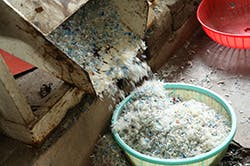Dow And Deep C Complete Recycled Plastic Road In Vietnam
The waste is cleaned, dried and shredded before being mixed with asphalt at a temperature between 150 and 180 degrees Celsius. At this temperature, the plastic is completely melted and bonded to the asphalt.
Dow and Deep C Industrial Zones complete the first asphalt road enhanced with recycled plastics at a Deep C industrial zone in Haiphong, Vietnam. The project is a collaboration between Dow and Deep C to provide innovative solutions to address plastics waste and advance a circular economy in Vietnam.
“Dow is working to find new uses for post-consumer plastics to advance a circular economy, retain the value of plastics and keep waste out of the environment,” says Ekkasit Lakkananithiphan, general director of Dow in Vietnam. “The project value chain is an impressive display of cross-sector collaboration – it brings together local governments, infrastructure investors, asphalt suppliers, waste collectors and the material science industry to help tackle the plastic waste issue in Vietnam.”
“The launch of our first recycled plastic road marks a significant milestone in DEEP C’s journey to become the pilot eco-industrial park in Vietnam,” says Bruno Jaspaert, general director of Deep C Industrial Zones. “These durable, safe new roads not only benefit Deep C and our tenants, but also serve as a powerful message as Vietnam places plastic waste management as a top environmental priority.”
The next phase of the project will be completed by November 2019, bringing the total road length to 1.4 km. It will divert a total of 6.5 metric tons of flexible packaging from becoming litter or entering landfills – the equivalent of more than 1.7 million flexible wrappers.The post-consumer recycled plastic, mostly flexible packaging such as polyethylene film, is sourced from local waste collector Urenco Haiphong. The waste is cleaned, dried and shredded before being mixed with asphalt at a temperature between 150 and 180 degrees Celsius. At this temperature, the plastic is completely melted and bonded to the asphalt, helping to create longer lasting, more durable roads.
Before the actual pavement, two laboratory tests were conducted by Vietnam Maritime University with the outcomes satisfying Vietnamese technical and safety requirements. Upon successful execution of the project, more asphalt roads using recycled plastics will be stretched all over the Deep C Industrial Zones.
For more information, visit: www.dow.com

